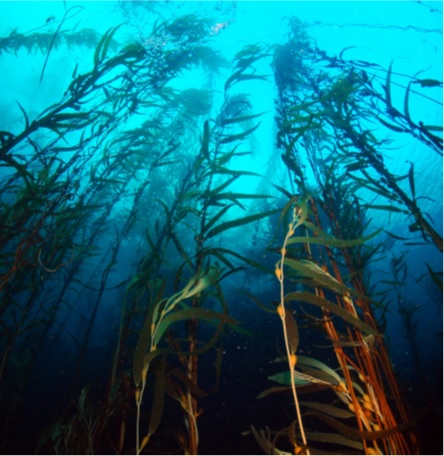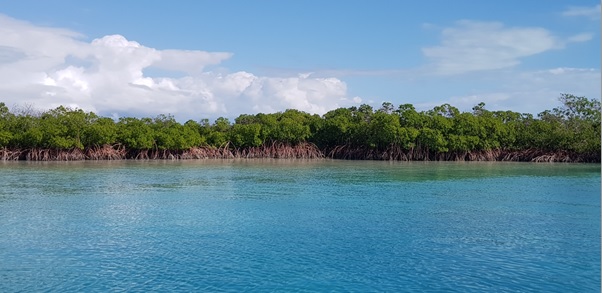Diverse Species and Ecosystems across the UK’s Overseas Territories – by OT-SIG
From whale sharks to penguins, from ice sheets to coral reefs, the UK’s 14 Overseas Territories host spectacular and globally significant species and ecosystems. In fact, 80-90% of UK’s biodiversity is in its Overseas Territories. This short article introduces the marine environments of two UKOTs – the Falkland Islands and the Turks and Caicos Islands.
The Falkland Islands
The marine and coastal environments of the Falkland Islands are striking – they support rich and diverse ecosystems and are incredibly productive. They provide feeding and breeding habitats that support globally significant populations of seabirds and marine mammals, both in terms of conservation status and population size (e.g. 80% of the global population of black-browed albatross). The inshore environment is biodiverse rich. It includes some of the world’s densest giant kelp forests that protect coastal areas from storms and provides vital nursery grounds for commercial and non-commercial finfish and squid species. Indeed, the inshore environment is a key trophic link to the outer Patagonian shelf system, pivotal in maintaining ecosystem function. However, there is still much to learn about the Falkland Islands marine environment and like many other OTs, the Falkland Islands are a scientific frontier with many of their ecosystems poorly studied. Incredibly, new species are being described every year through research at the South Atlantic Environmental Research Institute (SAERI), its local partner SMSG in the Falklands and other local and national partners. SAERI is currently implementing a Darwin Plus Project which is fine-scaling the design of Falkland Islands Marine Management Areas (DPLUS 071)

Image 1. Stunning kelp forests of the Falkland Islands © SMSG
The lives of around 3,000 Falkland Islanders are intricately connected to the sea. In a recent study (Bormpoudakis and Fish 2018) on the cultural ecosystem services of the Falklands a questionnaire respondent eloquently captures the connection that Falkland Islanders have with their coastal and marine environment, saying that they have an “[a]lmost pristine coastline hosting a particular community of wildlife suspended between Antarctic and sub-temperate climate,” while for another the islands are “not just wildlife but = land + sea + air = Holistically!! Huge skies; amazing sunsets; natural smells; beauty all around.”
The Turks and Caicos Islands
It is the striking sandy white beaches and exquisite turquoise blue water, with its rich marine biodiversity, that attracts many visitors wanting to experience the ‘Beautiful by Nature’ Turks and Caicos Islands (TCI), and that supports a thriving tourism industry. As a small island nation, the marine environment of the TCI is much larger than that of its terrestrial environment, and the islands’ population has formed close links to the sea that have been built up over generations. Many, if not all livelihoods in the TCI, in some way or other, are highly dependent on the rich biodiversity that the marine environment provides. Habitats such as mangroves, coral reefs and seagrasses support important nurseries for marine life, including important fisheries species such as conch and lobster, these habitats also provide coastal protection from hurricane induced storm surges. SAERI is currently working in TCI with partners in the Department of Environment and Coastal Resources to implement a Darwin Plus-funded project (DPLUS 094) to develop Marine Spatial Planning (MSP) Tools for TCI.

Image 2. Mangroves around TCI provide coastal protection from hurricane storm surge and serve as valuable nursery habitats for the rich biodiversity of marine life of the islands © SAERI
SAERI has its main office in the Falkland Islands and works with other UKOTs to enhance environmental evidence-bases and access to them; this includes marine projects in both the Falkland Island and the Turks and Caicos Islands.
For more information contact tpelembe@saeri.ac.fk or visit www.south-atlantic-research.org.
Members of the UK Overseas Territories Special Interest Group (OT-SIG) Committee volunteer their time to support members working in the area through providing opportunities to network, share skills and learn more about the profession. Find out more.